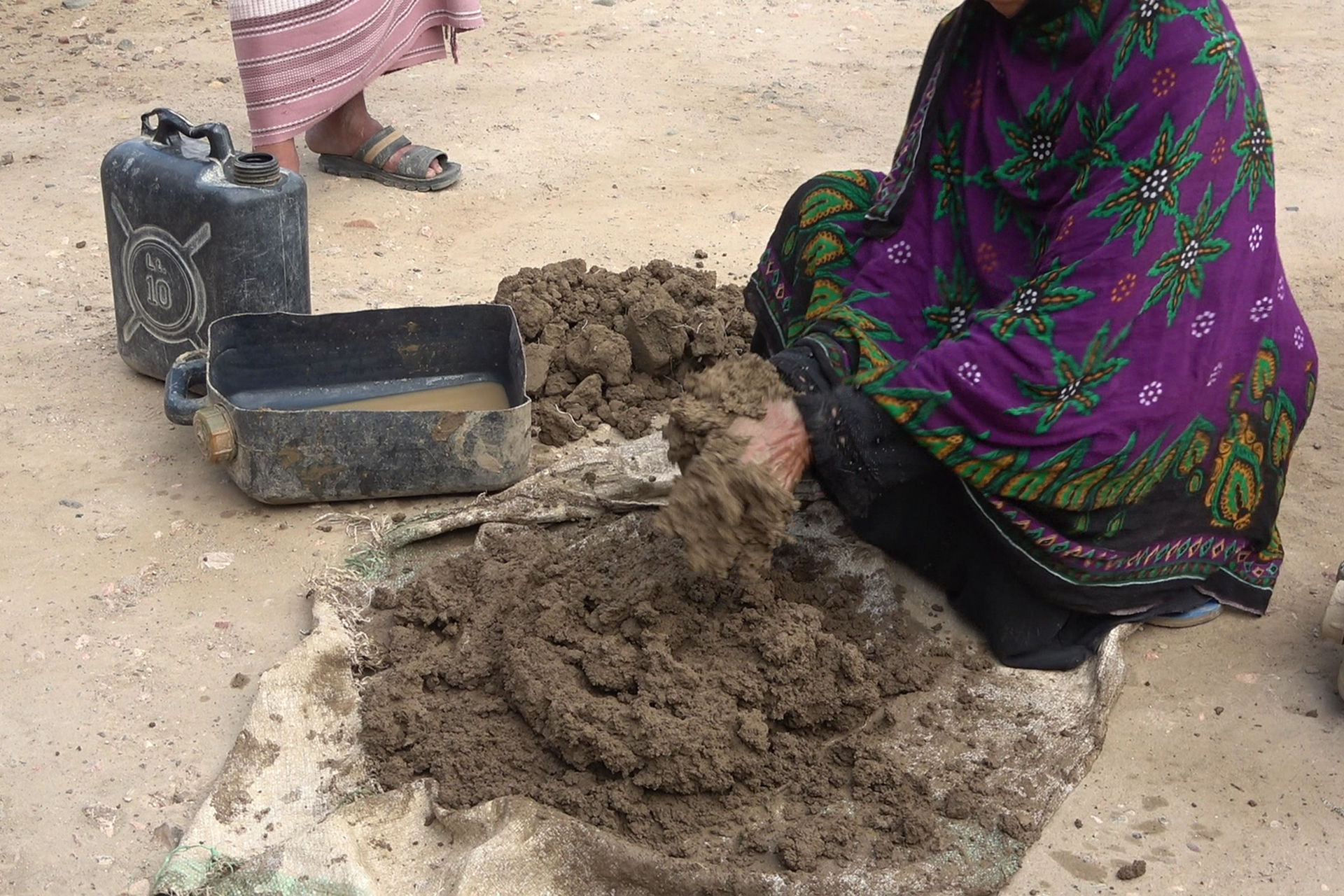Aden
- Every morning, the women of the Mudaraba District (150 km west of the city of Aden) in southern Yemen pack their belongings on foot and walk about 4 km from their homes to reach the dirt lands, where mud is the source of livelihood for many of them, especially during recent years, when poverty has increased and deteriorated their living situation.
Alia Abdullah spends hours digging the ground and collecting dirt and transporting it on her head to her home in stages, a profession that she was forced to do in the post-war years due to the death of her breadwinner and the heavy burden on her due to the need to spend on her children due to the low salary of her deceased husband (25 dollars), and as a result of deductions the family receives Only $20.
Making the tandoor from clay takes place in stages over two to three days (Al-Jazeera)
An arduous and strenuous process that the clay tandoor industry goes through, which is used for domestic purposes to cook food by lighting trees in it. According to Alia, the work begins after bringing the clay from the agricultural lands and bringing the remains of some animals and then kneading it with water.
Then the stage of work begins by making it in stages, where it is made by hands. Two tandoors are completed over two to three days due to leaving the tandoor under the sun for some time during the work to dry the wetness and help to complete it without defect.
Owners of agricultural lands in Yemen are allowed to bring some of them to mud for those who do not own land, without taking a fee in return for it, while others own agricultural lands as an inheritance from their ancestors.
The prices of the tandoor vary according to the size and range between 3 and 8 dollars, which is not enough to provide the lowest needs (Al-Jazeera)
Hard work for a cheap price
Female workers in the profession of making mud skirts face many obstacles, and Najah al-Aghbari, who works in the manufacture of these skirts, tells Al Jazeera Net that they suffer from the hardship of unprofitable work in terms of transporting dirt from the ground on their heads or on the backs of donkeys to the place of production next to homes.
According to Al-Aghbari, hard work and primitive work in industry weaken production, because the female workers work without a helper for them, and they need, between each stage and another, for some time to expose it to the sun and wind so that it dries up and completes the rest of the tandoor.
She added that the sale of these skirts does not take place on a daily basis, but on different days according to the request of customers, who ask the makers, whether ready-made skirts or preparing a size according to the need, and the prices of the skirts vary according to the size and range between 3 and 8 dollars, which is an amount that is not enough to provide the lowest needs in exchange for effort. that is being made into production.
The sale of the tandoor is not done on a daily basis, but according to the request of customers (Al-Jazeera)
Poverty and loss of breadwinner
Dr. Ashjan Al-Fadhli - a specialist in psychological support and family counseling at the University of Aden - believes that the factor of poverty and the loss of the breadwinner is the main motive for many women's work in arduous and tiring occupations, and that this is not due to the state of development that women are witnessing;
Rather, the economic conditions that pushed women, including the elderly, to work in any craft for a living, due to the high cost of living, the loss of heads of household, and the scarcity of wages, without regard to small income-generating projects.
An International Labor Organization report reveals the loss of 293,000 women working in the field of agriculture, animal husbandry and dairy products, at a time when the ongoing war in the country has reduced employment to 28%.
Women working in this profession need to market their product in a better way, commensurate with the amount of effort expended (Al-Jazeera)
lack of marketing
Siham Al-Salihi, head of the "My Craft" women's association, told Al Jazeera Net that women working in this profession need to market their product in a better way commensurate with the amount of effort expended, as they work alone at home and do not find the means to transport their product to the markets.
Al-Salihi also drew attention to entering the iron tandoor, which competed with this traditional clay product, which many rural residents still use in light of the gas crisis in the country.
Al-Salihi confirms that the tandoor makers work in the open and under the hot sun, and their industry faces danger in the rainy seasons because there are no suitable places to preserve what they produce.

